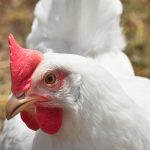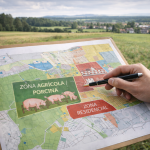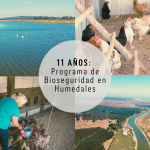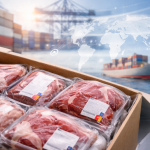The 2021 Annual Assembly of the Chilean Meat Exporters’ Association (ChileCarne) was held remotely on the morning of June 10. In addition to reporting on the activities from the last twelve months, the assembly reviewed the national and international issues that have an impact on the white meat industry. The Minister of Agriculture, María Emilia Undurraga, the Director of the Agricultural and Livestock Service (SAG), Horacio Bórquez, and the Director of the Office of Agricultural Research and Policies, ODEPA, Adolfo Ochagavía, attended the meeting’s inauguration and were presented with the main challenges of the industry today: China and the TTP11 signing, odor regulations, and new regulations for the prudent use of antibiotics.
Later, Minister Undurraga talked about how the work of the industry must be part of a joint effort and made herself available to continue collaborating. “This pandemic has confronted us with a reality we would have never imagined. The coordinated work of the food chain with all the parties involved is essential to maintain the supply chain. This does not mean there were not any issues, but we were able to find solutions together. Today we want to acknowledge that the association brings together an industry fully committed to the entire production chain, focused on sustainability and working together. We congratulate ChileCarne for its leadership in the “Chile Conscious Origin” program (Chile Origen Consciente), and we invite all its members to join in because we believe that this is the path we need to follow, not only in the short term but also in the long run.»
She also stated that “the pork sector faces considerable environmental challenges and we need to acknowledge the progress made through various initiatives to achieve a more sustainable production. We know that there is an issue with the legislative bill and that the odor standard is being drawn up to become a regulation capable of delivering and satisfying all parties, that does not limit the participation of small and medium-sized producers, and that makes it possible to reduce conflicts with the surrounding communities without becoming an obstacle for the sector.” She emphasized that the ministry’s technical teams have raised various issues and they are working on making the relevant adjustments. «It is an issue we are working on,» she said.
Undurraga ended her remarks by saying that working together will make it easier to tackle new challenges and new international and domestic demands. “The pandemic has proven that diversifying markets is key and that ASEAN presents a real option to this end, instead of placing our entire wager on China and Japan. The ministry has helped in this matter, for example, by obtaining the health authorization for the Philippine market. As such, ChilePork’s actions are essential to expand the promotion campaign in Asia,” she pointed out.
Afterwards, Juan Carlos Domínguez, President of ChileCarne, thanked the public sector officials for their attendance. After they said goodbye to the attendees, he continued with his presentation to the assembly: «currently, there are three strategic goals: growing Chilean pork and poultry exports, facilitating the proper operation of the country’s poultry and pork producing and exporting industry, becoming a technical reference for the industry, and defining a regulatory framework with the ministries and the legislature.”
Regarding the strategic pillars, Domínguez emphasized the focus is placed on animal health, meat safety, industry sustainability, and market facilitation. The executive reviewed the actions, events, seminars, and webinars that took place in the last year, which were connected to these four main topics.
He then summarized the current situation, the international market, and the opportunities for meat exports in the primary destination markets (China, Japan, and South Korea); markets of interest (Europe, the United States, and Mexico, etc.); and potential markets (the Philippines, Indonesia, Thailand, and Vietnam). He highlighted that «our focus is to find new markets or alternative destinations so that when China returns to normal, our exports do not depend solely on one country.»
«Despite the pandemic, if we review the numbers, poultry exports have been decreasing due to COVID-19, while pork exports have continued to grow, both in value and volume. Currently, China is still the main meat importing country worldwide,” he underscored. Domínguez talked about the strategy adopted by the industry and SAG since 2019 to control a potential spread of African swine fever in Chile (ads, sanitizing footbaths, the Canine Brigade, pre-border controls, etc.). He also mentioned new health requirements stressing the importance of setting goals in each link of the chain. «Today, we consider the entire production chain,» he said.
Domínguez’s presentation was complemented by brief interventions by other attendees, such as Daniela Álvarez, Deputy Sustainability Manager of the association, who talked about the “Chile Conscious Origin” program: “We want Chile to become an internationally renowned country under the umbrella of Chile Conscious Origin,” she stated.
Later on, Domínguez went on to address the issue of water, explaining that the industry is conducting a survey and a study on its use by the Chilean pork and poultry sector. “We are closely monitoring what is going on,” he said.
Finally, he reviewed the results of the 2020-2021 campaign to position Chilean pork in Asia and he highlighted the important work that the ChilePork brand has done in the last period. “Despite the pandemic, there were many activities, events, social media opportunities, videos, and the campaign, which undoubtedly has been very effective since our brand and the attributes of our products are still relevant for our importers, distributors, and chefs. It has been a good strategy not to let up and continue to be present as much as possible in the main destination markets,” he emphasized.






